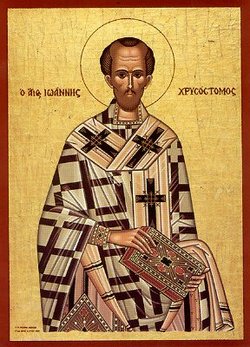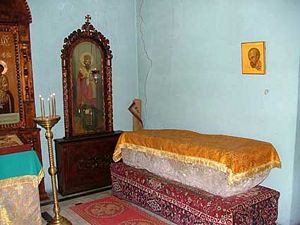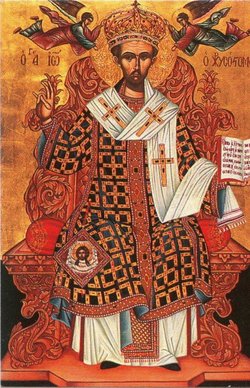Ioan Gură de Aur: Diferență între versiuni
(→Source) |
(→Source) |
||
| Linia 76: | Linia 76: | ||
:All-blest and venerable John Chrysostom, | :All-blest and venerable John Chrysostom, | ||
:we worthily praise you, for you are our teacher, revealing things divine! | :we worthily praise you, for you are our teacher, revealing things divine! | ||
| − | == | + | ==Surse== |
| − | *[[w:John Chrysostom|''John Chrysostom'' | + | *[[w:John Chrysostom|''John Chrysostom'' pe Wikipedia]] |
| − | |||
| − | |||
== External links == | == External links == | ||
Versiunea de la data 25 iunie 2007 09:40
| Acest articol (sau părți din el) este propus spre traducere din limba engleză!
Dacă doriți să vă asumați acestă traducere (parțial sau integral), anunțați acest lucru pe pagina de discuții a articolului. |
Cel întru Sfinți Părintele nostru Ioan Gură de Aur (347-407), Arhiepiscop al Constantinopolului a fost un cunoscut episcop și predicator din secolele IV-V, în Siria și Constantinopol. Este binecunoscut pentru elocvența cuvântărilor sale publice și pentru denunțarea abuzurilor de autoritate din Biserică și din Imperiul Roman din acea vreme. Avea o mare aplecare spre asceză. După trecerea sa la Domnul, a fost numit Chrysostomos, din grecescul chrysostomos, care se traduce prin Gură de Aur. Biserica Ortodoxă îl cinstește ca sfânt (cu pomenirea la 13 noiembrie) și l-a rânduit între Sfinţii Trei Ierarhi (pomeniți pe 30 ianuarie), alături de Sfântul Vasile cel Mare și cu Sfântul Grigorie Teologul. Este recunoscut și de Biserica Romano-Catolică, care îl cinstește ca Sfânt și Doctor al Bisericii, precum și de Biserica Anglicană, ambele făcându-i pomenirea la 13 septembrie. O parte din sfintele sale Moaşte au fost furate de cruciați în 1204 (amintirea acestui eveniment se face la 27 ianuarie) și duse la Roma, fiind restituite Bisericii Constantinopolului pe 27 noiembrie 2004 de către Papa Ioan Paul al II-lea.
Uneori este numit și "Ioan al Antiohiei," dar acest nume se referă în realitate la un episcop al Antiohiei din anii 429-441 d. Hr., care a condus un grup de episcopi răsăriteni moderați în timpul controversei nestoriene.
Cuprins
Life
He was born in Antioch of noble parents: his father was a high-ranking military officer. His father died soon after his birth and so he was brought up by his Christian mother. He was baptized in 370 and tonsured a reader (one of the minor orders of the Church). He began his education under a pagan teacher named Libanius, but went on to study theology under Diodore of Tarsus (one of the leaders of the later Antiochian School) while practising extreme asceticism. He was not satisfied, however, and became a hermit (circa 375) and remained so until poor health forced a return to Antioch.
He was then ordained a deacon in 381 by St. Meletius of Antioch, and was ordained a presbyter in 386 by Bishop Flavian I of Antioch. It seems this was the happiest period of his life. Over about twelve years, he gained much popularity for the eloquence of his public speaking. Notable are his insightful expositions of Bible passages and moral teaching. The most valuable of his works are his Homilies on various books of the Bible. He particularly emphasized almsgiving. He was also most concerned with the spiritual and temporal needs of the poor. He spoke out against abuse of wealth and personal property. In many respects, the following he amassed was no surprise. His straightforward understanding of the Scriptures (in contrast to the Alexandrian tendency towards allegorical interpretation) meant that the themes of his talks were eminently social, explaining the Christian's conduct in life.
One incident that happened during his service in Antioch perhaps illustrates the influence of his sermons best. Around the time he arrived in Antioch, the bishop had to intervene with the Emperor St. Theodosius I on behalf of citizens who had gone on a riotous rampage in which statues of the Emperor and his family were mutilated. During the weeks of Lent in 397, John preached 21 sermons in which he entreated the people to see the error of their ways. These apparently had a lasting impression on the people: many pagans reportedly converted to Christianity as a result of them. In the event, Theodosius' vengeance was not as severe as it might have been, merely changing the legal standing of the city.
In 398 he was called (somewhat against his will) to be the bishop of Constantinople. He deplored the fact that Imperial court protocol would now assign to him access to privileges greater than the highest state officials. During his time as bishop he adamantly refused to host lavish entertainments. This meant he was popular with the common people, but unpopular with the wealthy and the clergy. In a sermon soon after his arrival he said, "people praise the predecessor to disparage the successor." His reforms of the clergy were also unpopular with these groups. He told visiting regional preachers to return to the churches they were meant to be serving—without any pay out.
His time there was to be far less at ease than in Antioch. Theophilus, the Pope of Alexandria, wanted to bring Constantinople under his sway and opposed John's appointment to Constantinople. Being an opponent of Origen's teachings, he accused John of being too partial to the teachings of that master. Theophilus had disciplined four Egyptian monks (known as "the Tall Brothers") over their support of Origen's teachings. They fled to and were welcomed by John. He made another enemy in Aelia Eudoxia, the wife of the eastern Emperor Arcadius, who assumed (perhaps with justification) that his denunciations of extravagance in feminine dress were aimed at herself.
St. John was fearless when denouncing offences in high places. An alliance was soon formed against him by Eudoxia, Theophilus and other enemies of his. They held a synod in 403 to charge John, in which the accusation of Origenism was used against him. It resulted in his deposition and banishment. He was called back by Arcadius almost immediately, however, for the people of the city were very angry about his departure. There was also a "quaking" in the Imperial bedroom (thought to be either an actual earthquake or perhaps as a stillbirth or miscarriage for the empress) which was seen as a sign of God's anger. Peace was shortlived. A silver statue of Eudoxia was erected near the cathedral of Hagia Sophia. John denounced the dedication ceremonies. He spoke against her in harsh terms: "Again Herodias rages; again she is confounded; again she demands the head of John on a charger" (an allusion to the events surrounding the death of John the Forerunner). Once again he was banished, this time to Caucasus in Georgia.
The pope in Rome (Innocent I at this time) protested at this banishment, but to no avail. John wrote letters which still held great influence in Constantinople. As a result of this, he was further exiled to Pityus (on the eastern edge of the Black Sea). However, he never reached this destination, as he died during the journey. His final words were "Glory be to God for all things!"
Importanța Sf. Ioan Gură de Aur
Într-o vreme în care clerul cetății era vehement criticat pentru stilul său de viață luxos, Sfântul Ioan era hotărât să reformeze clerul din Constantinopol. Eforturile sale s-au lovit de o serioasă rezistență și au avut un efect limitat. Ca teolog, el a fost și rămâne foarte important pentru creștinătatea răsăriteană, dar a fost considerat mai puțin important pentru creștinii din Occident. El a refuzat în general să urmeze aplecarea contemporanilor săi spre alegorie, preferând vorbirea directă si aplicând pasaje și lecții din Sfânta Scriptură la viața de zi cu zi. Într-o anumită măsură, scrierile lui constituie o sinteză între metoda hermeneutică a mai alegoricei Școli din Alexandria și literalismul Școlii Antiohiene.
Exilarea sa în mai multe rânduri arată că puterea seculară avea o puternică influență în Biserica răsăriteană din această perioadă istorică. Aceasta revelă totodată rivalitatea dintre Constantinopol și Alexandria, fiecare dorind să aibă întâieteatea în Biserică. Această ostilitate reciprocă a adus, în cele din urmă, multe suferințe atât Bisericii cât și Imperiului Roman de Răsărit. Între timp, în Vest, primatul Bisericii Romei rămăsese necontestat începând cu secolul al IV-lea. Este interesant de menționat, în perspectiva evoluției ulterioare a autorității Papei, faptul că protestele Papei Inocențiu al II-lea în acel moment nu au avut nici un efect, ceea ce arată lipsa de influență a episcopilor Romei asupra Răsăritului chiar din acea perioadă.
Quotes
"In the matter of piety, poverty serves us better than wealth, and work better than idleness, especially since wealth becomes an obstacle even for those who do not devote themselves to it. Yet, when we must put aside our wrath, quench our envy, soften our anger, offer our prayers, and show a disposition which is reasonable, mild, kindly, and loving, how could poverty stand in our way? For we accomplish these things not by spending money but by making the correct choice. Almsgiving above all else requires money, but even this shines with a brighter luster when the alms are given from our poverty. The widow who paid in the two mites was poorer than any human, but she outdid them all."
"For Christians above all men are forbidden to correct the stumblings of sinners by force...it is necessary to make a man better not by force but by persuasion. We neither have autority granted us by law to restrain sinners, nor, if it were, should we know how to use it, since God gives the crown to those who are kept from evil, not by force, but by choice."
"When an archer desires to shoot his arrows successfully, he first takes great pains over his posture and aligns himself accurately with his mark. It should be the same for you who are about to shoot the head of the wicked devil. Let us be concerned first for the good order of sensations and then for the good posture of inner thoughts."
"Even if we have thousands of acts of great virtue to our credit, our confidence in being heard must be based on God's mercy and His love for men. Even if we stand at the very summit of virtue, it is by mercy that we shall be saved."
"Why do you beat the air and run in vain? Every occupation has a purpose, obviously. Tell me then, what is the purpose of all the activity of the world? Answer, I challenge you! It is vanity of vanity: all is vanity."
The Homilies against the Judaizers
Chrysostom wrote of the Jews and of Judaizers in eight homilies Adversus Judaeos (against the Judaizers) [1]. These quotes are translations posted by Paul Halsall from the original Greek: other researchers give slightly different translations. At the time he delivered these sermons, Chrysostom was a tonsured reader and had not yet been ordained a priest or bishop.
- "The festivals of the pitiful and miserable Jews are soon to march upon us one after the other and in quick succession: the feast of Trumpets, the feast of Tabernacles, the fasts. There are many in our ranks who say they think as we do. Yet some of these are going to watch the festivals and others will join the Jews in keeping their feasts and observing their fasts. I wish to drive this perverse custom from the Church right now." (Homily I, I, 5)
- "Shall I tell you of their plundering, their covetousness, their abandonment of the poor, their thefts, their cheating in trade? The whole day long will not be enough to give you an account of these things. But do their festivals have something solemn and great about them? They have shown that these, too, are impure." (Homily I, VII, 1)
- "But before I draw up my battle line against the Jews, I will be glad to talk to those who are members of our own body, those who seem to belong to our ranks although they observe the Jewish rites and make every effort to defend them. Because they do this, as I see it, they deserve a stronger condemnation than any Jew." (Homily IV, II, 4)
- "Are you Jews still disputing the question? Do you not see that you are condemned by the testimony of what Christ and the prophets predicted and which the facts have proved? But why should this surprise me? That is the kind of people you are. From the beginning you have been shameless and obstinate, ready to fight at all times against obvious facts." (Homily V, XII, 1)
Many researchers believe that the purpose of these attacks was to prevent Christians from joining with Jewish customs, and thus prevent the erosion of Chrysostom's flock. Others characterize Chrysostom and other Church fathers as anti-Semitic.
See also: Was Saint John Chrysostom Anti-Semitic?
Work on liturgy
Two of his writings deserve special mention. He harmonized the liturgical life of the Church by revising the prayers and rubrics of the Divine Liturgy, or celebration of the Holy Eucharist. To this day, the Orthodox Church typically celebrates the Divine Liturgy of John Chrysostom, together with Roman Catholic churches that are in the Eastern or Byzantine rites (i.e., Uniates). These same churches also read his Paschal Homily at every Pascha, the greatest feast of the Church year.
Modern influence
Whatever the original intent of Chrysostom, his writings have been circulated by many groups in an attempt to foster anti-Semitism or opposition to Christianity. One of the groups to use him thus were the Nazis during World War II. They used St. John's writings to try to convince Christians in Germany and Austria that the Jews deserved to be exterminated.
Additionally, Orthodox Christians throughout the world participate in St. John's Divine Liturgy nearly every week and hear his famous Paschal Homily at every Pascha.
Hymns
Troparion (Tone 8)
- Grace shining forth from your lips like a beacon has enlightened the universe.
- It has shown to the world the riches of riches poverty;
- it has revealed to us the heights of humility.
- Teaching us by your words, O Father John Chrysostom,
- intercede before the Word, Christ our God, to save our souls!
Kontakion (Tone 6)
- Having received divine grace from heaven,
- with your mouth you teach all men to worship the Triune God.
- All-blest and venerable John Chrysostom,
- we worthily praise you, for you are our teacher, revealing things divine!
Surse
External links
- The Saint John Chrysostom Webpage
- Works about and by John Chrysostom from the Christian Classics Ethereal Library
- John Chrysostom, Archbishop of Constantinople (GOARCH)
- Removal of the Relics of John Chrysostom, Archbishop of Constantinople (GOARCH)
- St. John Chrysostom the Archbishop of Constantinople (OCA)
- Repose of St John Chrysostom, Archbishop of Constantinople (OCA)
- Translation of the relics of St John Chrysostom the Archbishop of Constantinople (OCA)
- November 13, 2004 : The Martyrdom of Saint John Chrysostom (Antiochian)
- A few beautiful icons of St. John Chrysostom
Sfintele sale Moaşte. Mâna Sfântului
Categorii > Istoria Bisericii
Categorii > Liturgică
Categorii > Liturgică > Sărbători > Sfinți > Sfinți Părinți
Categorii > Liturgică > Sărbători > Sfinți > Sfinți bizantini
Categorii > Oameni
Categorii > Oameni
Categorii > Oameni
Categorii > Oameni > Cler
Categorii > Oameni > Cler
Categorii > Oameni > Episcopi
Categorii > Oameni > Episcopi > Episcopi după localitate > Patriarhi ai Constantinopolului
Categorii > OrthodoxWiki > Articole de calitate
Categorii > Teologie > Teologi



